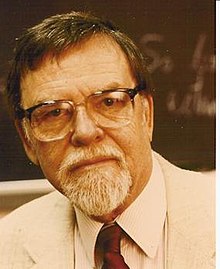Paul E. Meehl | |
|---|---|
 | |
| Born | Paul Everett Swedal 3 January 1920 Minneapolis, Minnesota, U.S. |
| Died | 14 February 2003 (aged 83) Minneapolis, Minnesota, U.S. |
| Alma mater | University of Minnesota (BA, PhD) |
| Known for | Minnesota Multiphasic Personality Inventory, genetics of schizophrenia, construct validity, clinical v. statistical prediction, philosophy of science, taxometrics |
| Awards | National Academy of Sciences (1987), APA Award for Lifetime Contributions to Psychology (1996), James McKeen Cattell Fellow Award (1998), Bruno Klopfer Award (1979) |
| Scientific career | |
| Fields | Psychology, philosophy of science |
| Institutions | University of Minnesota |
| Doctoral advisor | Starke R. Hathaway |
| Doctoral students | Harrison G. Gough, Dante Cicchetti, Donald R. Peterson, George Schlager Welsh |
| Website | meehl |
Paul Everett Meehl (3 January 1920 – 14 February 2003) was an American clinical psychologist. He was the Hathaway and Regents' Professor of Psychology at the University of Minnesota, and past president of the American Psychological Association.[1] A Review of General Psychology survey, published in 2002, ranked Meehl as the 74th most cited psychologist of the 20th century, in a tie with Eleanor J. Gibson.[2] Throughout his nearly 60-year career, Meehl made seminal contributions to psychology, including empirical studies and theoretical accounts of construct validity, schizophrenia etiology, psychological assessment, behavioral prediction, metascience, and philosophy of science.
- ^ "Curriculum Vitae | Paul E. Meehl". meehl.umn.edu. Retrieved 2019-01-02.
- ^ Haggbloom, Steven J.; Warnick, Renee; Warnick, Jason E.; Jones, Vinessa K.; Yarbrough, Gary L.; Russell, Tenea M.; Borecky, Chris M.; McGahhey, Reagan; Powell III, John L.; Beavers, Jamie; Monte, Emmanuelle (2002). "The 100 most eminent psychologists of the 20th century". Review of General Psychology. 6 (2): 139–152. CiteSeerX 10.1.1.586.1913. doi:10.1037/1089-2680.6.2.139. S2CID 145668721.